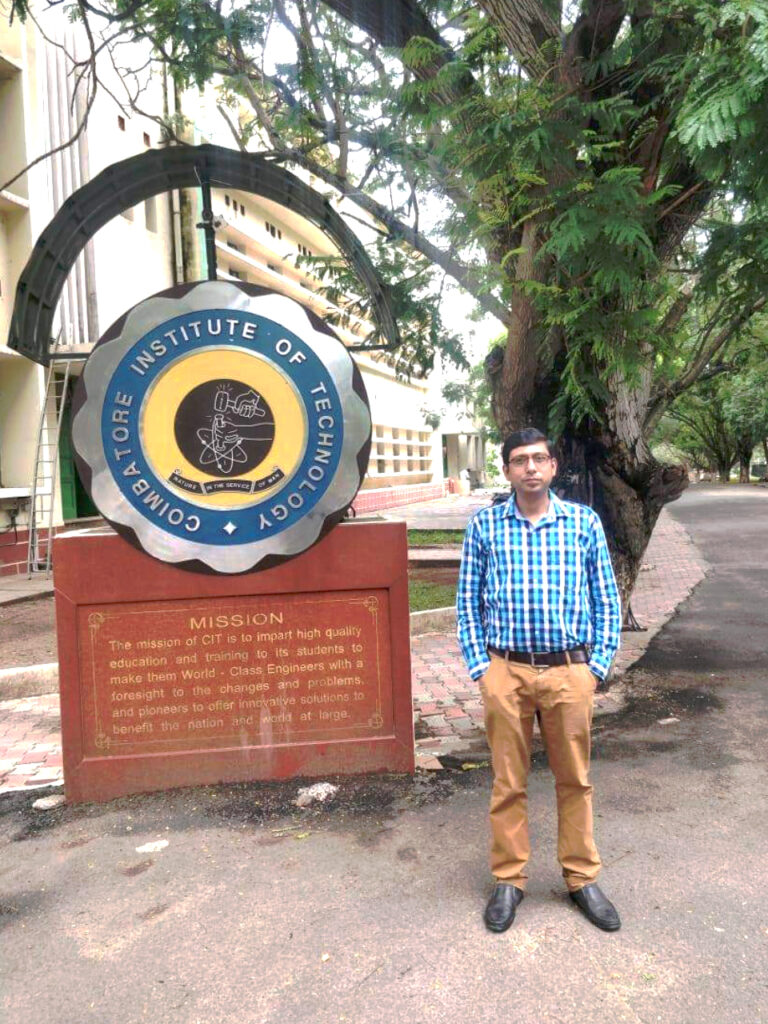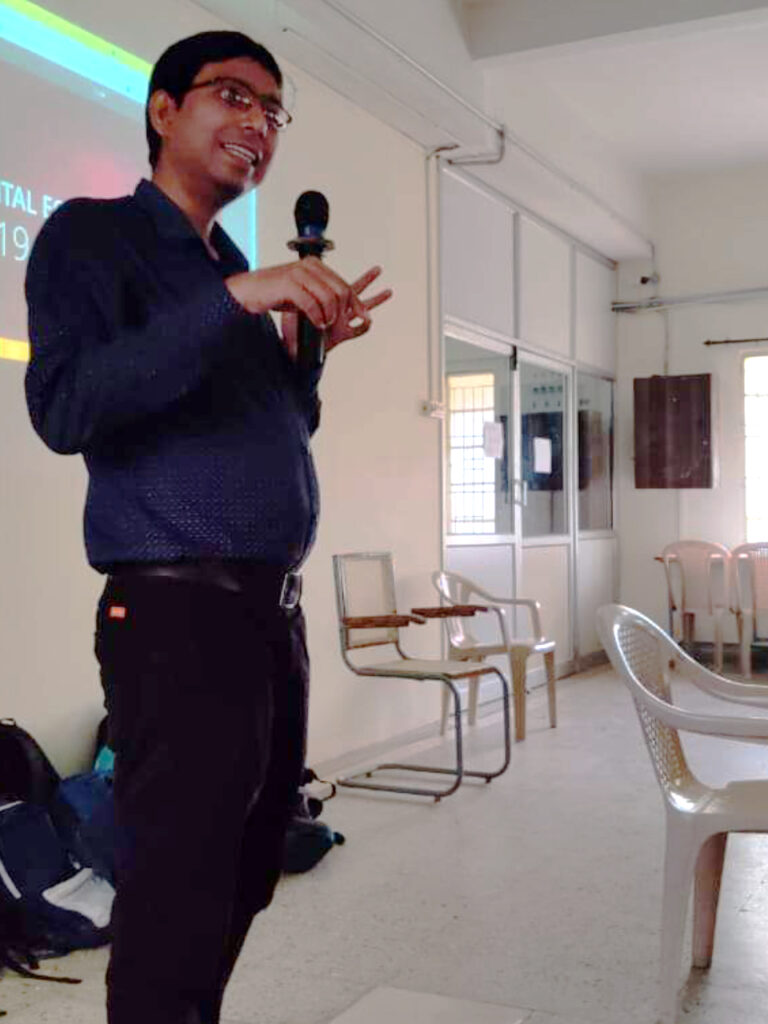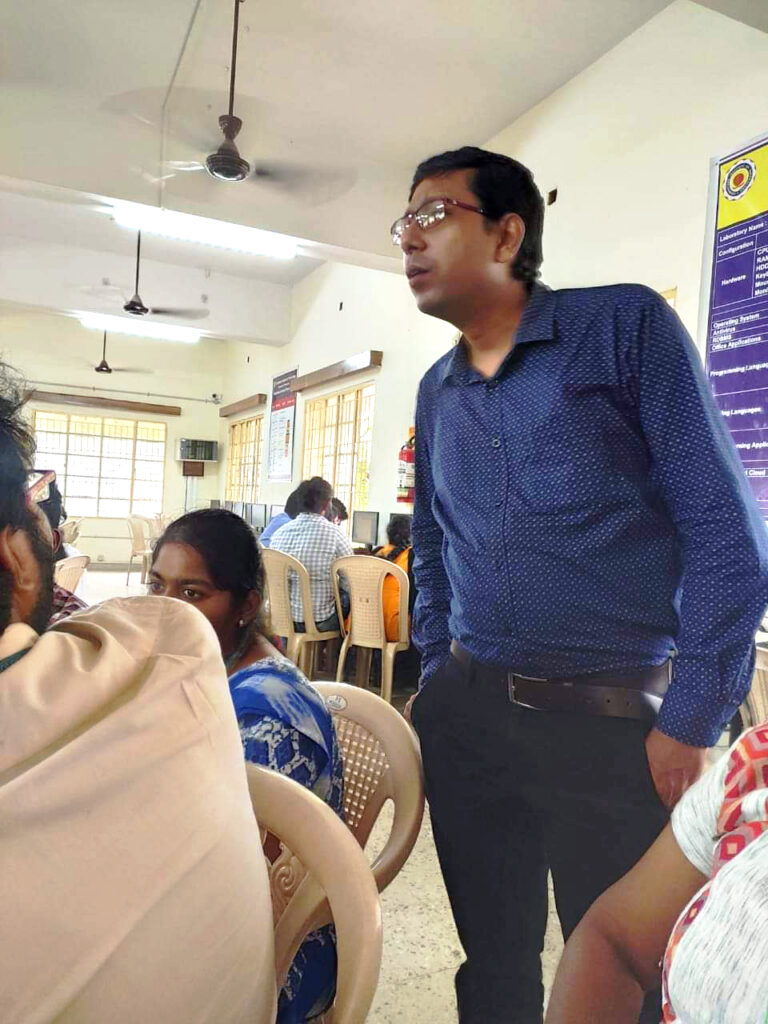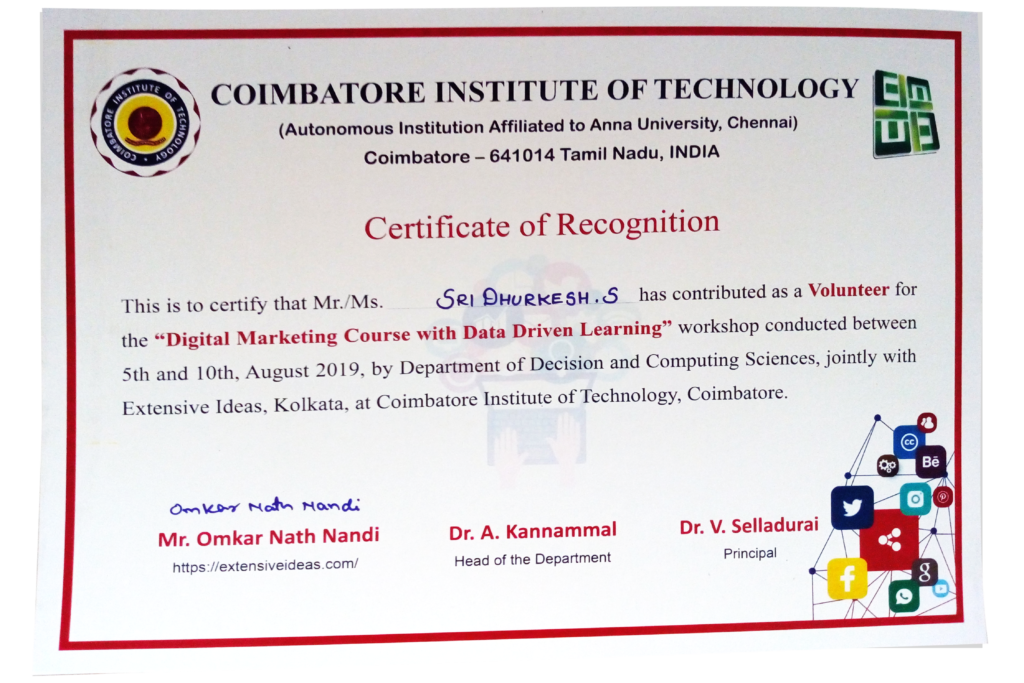In 2019, I had the privilege of serving as a guest faculty for the MSc Data Science batch at the esteemed Coimbatore Institute of Technology (CIT). This experience not only allowed me to share my expertise in data-driven digital marketing but also enabled me to inspire and mentor a new generation of students eager to explore the evolving field of digital marketing. The course I conducted was aimed at bridging the gap between data science and digital marketing, focusing on how data can drive impactful marketing strategies.
Course Overview: Data Driven Digital Marketing for MSc Students of Coimbatore Institue of Techology
The course was designed to offer students a comprehensive understanding of data-driven digital marketing, blending theoretical concepts with practical implementation. The curriculum was tailored to meet the needs of data science students, emphasizing how data analytics and digital marketing intersect to create effective strategies.




Curriculum Structure of Data-Driven Digital Marketing
The course was structured over a week, covering various topics that highlighted the role of data in digital marketing. Here’s a detailed breakdown of the curriculum:
- Day 1: Introduction to Digital Marketing and Data Science Integration
- Overview of digital marketing channels (SEO, PPC, Social Media, Email).
- How data science enhances marketing effectiveness.
- Real-world case studies demonstrating the synergy between data analysis and marketing strategies.
- Tools introduced: Google Analytics, HubSpot, and basic Python for data analysis in marketing.
- Day 2: Understanding Data in Digital Marketing
- Types of data in marketing: Demographic, behavioral, and transactional.
- Data collection methods: Website analytics, CRM data, social media insights, and surveys.
- Introduction to data cleaning and preprocessing for marketing campaigns.
- Practical session: Using Google Analytics to track website data and extract actionable insights.
- Day 3: Search Engine Optimization (SEO) and Data Analytics
- How data drives SEO strategies, including keyword research, technical SEO audits, and content optimization.
- Analyzing search trends using tools like Ahrefs, SEMrush, and Google Trends.
- Real-time data application for keyword analysis and content planning.
- Workshop: Students performed SEO audits for live websites, utilizing data-driven tools to identify improvement areas.
- Day 4: Pay-Per-Click (PPC) Advertising and Data-Driven Campaigns
- Introduction to PPC and data utilization for ad targeting, budgeting, and bidding strategies.
- Setting up PPC campaigns on Google Ads with a focus on data-driven decision-making.
- Analyzing ad performance: CTR, conversion rates, and ROI measurement.
- Hands-on project: Creating and managing a data-driven PPC campaign, followed by performance analysis.
- Day 5: Social Media Analytics and Content Optimization
- Utilizing social media analytics for effective campaign management.
- Understanding engagement metrics, sentiment analysis, and influencer collaborations.
- Data-driven content planning for social media marketing: Identifying trends, audience interests, and optimal posting times.
- Practical task: Developing a content strategy based on social media data insights.
- Day 6: AI in Digital Marketing
- Introduction to AI-driven tools for marketing automation, predictive analytics, and customer segmentation.
- AI applications in marketing: Chatbots, personalized recommendations, and NLP-driven content creation.
- Using AI tools like Jasper, HubSpot, and AI-powered SEO tools for campaign enhancement.
- Workshop: Students explored AI-driven marketing tools, learning how AI can automate campaign management, enhance personalization, and improve decision-making.
- Day 7: Final Project and Presentation
- Students were grouped to work on a comprehensive digital marketing project, integrating all the skills and tools covered during the week.
- Project themes included data-driven SEO campaigns, PPC ad management with predictive analytics, and social media strategies supported by AI tools.
- Each group presented their findings, showcasing how data was used to improve marketing outcomes.
- Feedback was provided on presentation skills, project execution, and data analysis accuracy.

Teaching Methodology
My approach at CIT was focused on a blend of theoretical knowledge, practical application, and project-based learning:
- Interactive Lectures: Each session was designed to be interactive, with a focus on real-world examples that demonstrated the application of data science in digital marketing.
- Hands-On Workshops: Practical tasks were conducted during each session, allowing students to implement the concepts they learned.
- Collaborative Learning: Group projects encouraged teamwork, critical thinking, and problem-solving skills.
- Real-Time Data Analysis: Students were exposed to real-time data, analyzing it to drive marketing strategies and campaigns.
Outcomes and Student Feedback
The students exhibited a strong grasp of data-driven digital marketing concepts, showcasing creativity and analytical thinking in their final projects. The course received positive feedback from both students and faculty, with many students expressing interest in pursuing digital marketing roles that leverage their data science skills. The success of this course highlighted the demand for interdisciplinary courses that combine data science with digital marketing, preparing students for real-world marketing challenges.
Offering the Course to Other Organizations
This curriculum can be adapted for other universities, colleges, or institutes that aim to integrate data-driven digital marketing into their programs. The course can be tailored for:
- Undergraduate and Postgraduate Programs: Offering foundational and advanced knowledge in digital marketing, emphasizing data-driven strategies.
- Diploma and Certificate Courses: Providing a condensed version of the curriculum with a focus on practical skills and real-world applications.
- Corporate Training Programs: Catering to marketing teams looking to leverage data and AI for improved campaign outcomes.
Why Choose This Course?
This course is designed to offer a comprehensive understanding of how data and AI can transform digital marketing. Here’s why it’s valuable:
- Industry-Relevant Skills: Students learn the latest digital marketing techniques and tools used by top marketers globally.
- Practical Experience: Real-world projects ensure that students can apply theoretical knowledge effectively.
- AI Integration: The inclusion of AI-driven tools and techniques prepares students for the future of digital marketing.
- Experienced Mentor: With over 15 years of experience in digital marketing, I bring real-world insights and practical knowledge to the classroom.
Conclusion
My experience as a guest faculty at CIT has been fulfilling, providing students with the knowledge and skills needed to excel in digital marketing roles. I am open to offering this curriculum to other universities and institutions, helping more students become proficient in data-driven digital marketing and AI.
Omkar’s Profile Site:
This segment introduces Omkar Nath Nandi’s professional website, which showcases his career journey, achievements, and expertise in digital marketing. It acts as a comprehensive portfolio of his work, detailing successful projects, campaigns, and strategies across various digital marketing channels. Visitors can explore his skills, certifications, and contributions to the industry, making it a resource for potential clients, collaborators, and students seeking to learn from his experience.
- Local SEO Mastery by Omkar Nath Nandi
- Data-Driven PPC Campaigns by Omkar Nath Nandi on Google Ads, LinkedIn Ads, Meta Ads, Twitter Ads, YouTube Ads
- Effective Email Marketing Strategies by Omkar Nath Nandi using CRM or Email Tools
- Mastering ChatGPT Prompts for SEO: A Comprehensive Guide
- Unveiling the Secrets of Quora Success: Building Your Brand and Generating Leads
News Letter – What is digital marketing:
Omkar’s LinkedIn newsletter series titled “What is Digital Marketing” is a regular publication aimed at providing comprehensive insights into various digital marketing areas. Each issue covers specific topics, from foundational strategies to advanced techniques, tailored to enhance marketers’ skills. It serves as a valuable resource for both beginners and experienced professionals, offering in-depth analysis, case studies, and tips to succeed in the digital marketing space.
- Revolutionize Your On-Page SEO with SEO GPT: An AI-Driven Solution for All Website Types
- AI-Driven Personalization in Digital Marketing: How GPT Models Are Revolutionizing Customer Experiences
- Harness the Power of LinkedIn for Your Brand
- The Nvidia Blackwell Chip vs AMD MI300X: The Comparative Chip Battle and Intel’s Decline?
- Boosting SEO for a 1000-Page Website Using ChatGPT and Google Sheets
